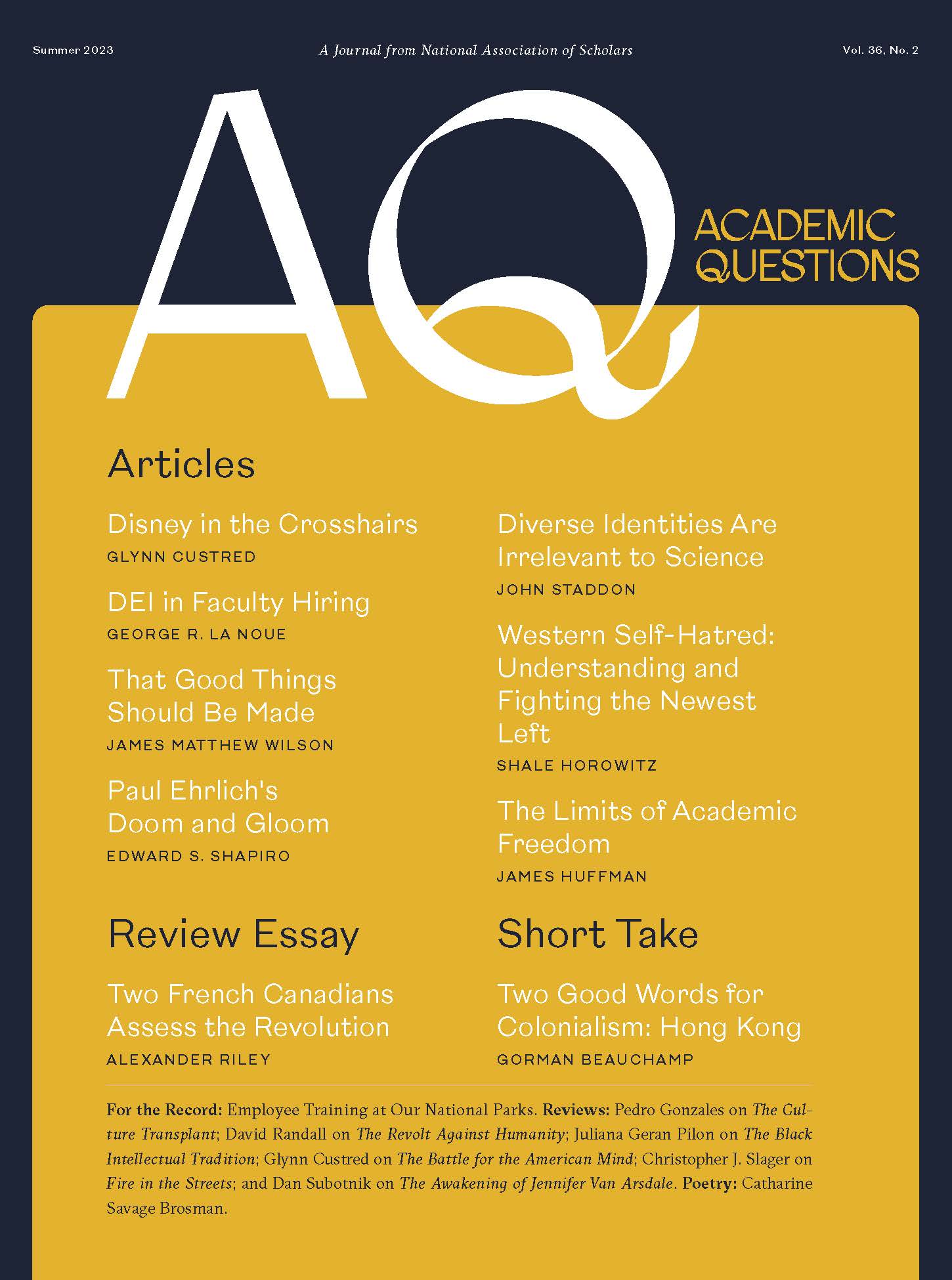What is the status of the West’s far left? The purest, most influential version of its faith, Marxism, has seen its utopia die. Paler versions of the faith, social democracy and welfarism, have likewise witnessed the death of their more utopian hopes—as more ambitious policy experiments have degenerated into social dysfunction, bureaucratic inefficiency, and political corruption.
This is the impetus behind the newest left—the West’s self-hatred movement. As the old economic utopias died, it became more reasonable to return to understand and appreciate the West’s traditional strengths. Yet most leftist believers, rather than move away from the old faith, seek to conserve and justify it through a more uncompromising hatred of tradition. As Göran Adamson, Pascal Bruckner, Douglas Murray, and many others have shown, the renewed hatred no longer targets all traditions, but vilifies only the West.1
Consider what has become the centerpiece of Western self-hatred—the evils perpetrated by “white” people against other racial or ethnic groups. Central arguments are that whites and the West are responsible for all or most evil, and that this evil overshadows any alleged good works that might raise doubts about whether whites and Western tradition are appropriate hate figures. In U.S. history, it is not enough that slavery, Jim Crow, and other forms of racial discrimination were and are important causes of unequal outcomes at the group level. They must be the only cause, and those who disagree with this obviously false premise must be stigmatized as racists themselves.2 The defining characteristic of U.S. history is not its revolutionary and successful, if-still-imperfect, experiment in republican government, but slavery and other forms of racial discrimination.3 In other words, the history of the United States is fundamentally evil rather than largely good. It also follows that any “progressive” ideologies or policies, past or present, that fail to produce the intended group-level benefits fail because of racism. There are only two significant forces: the anti-racists struggling to do good, and the racist society that defeats their efforts.
Such self-hatred is most notable not for its failings of logic and evidence, but for how its worldview is so fervently embraced by the left. As many have pointed out, the old worldview of the left toward the past and present—during the long period before the death of the socialist economic utopia—could be summarized by substituting “capitalism” for “racism.”4 This is no accident. It shows the longstanding, central importance of the traditional leftist hate figure, which most recently has taken the form of demonizing the West. If we are to fight the newest left effectively, we must recognize that Western self-hatred has become its core ideology.
Western Self-Hatred and Its Utopian Allies
Civilizational self-hatred is a systemic, extreme, and one-sided criticism of the values, institutions, and history of one’s own civilization which is not extended to other civilizations. The West or one of its component parts (such as the United States or the United Kingdom) or systems (such as the traditional family, traditional religion, the market economy, or the criminal justice system) are typically attacked as wholes when the relevant issue or criticism would more logically apply to particular persons, events, or issues. The defects are so far-reaching and there are so few redeeming features, that only revolutionary change can be considered as a remedy. The status quo is so debased that there is no point in discussing the relative merits of incremental reforms, and little need to get into the specifics of why any proposed revolutionary changes will work better than the status quo. Implicitly, anything but the status quo will be an improvement.
These criticisms are not applied equally to non-Western civilizations or their component parts or systems. There is a relentless and near-exclusive negative focus on Western targets. The West is the primary ideological enemy. Other civilizations are viewed as blameless victims of the West, to be either ignored or selectively flattered, largely based on their utility as potential allies in the struggle.
Self-hatred is distinct from other types of self-critical worldviews. Skepticism judges all civilizations according to the same standards, and so may see redeeming features in all of them. Nihilism condemns all civilizations according to the same harsh standards. Reformists, by seeking improvements in various areas, are necessarily self-critical. But, like skeptics, reformists also see strengths worth conserving, and so are likely to understand that self-hatred will tend to undermine their reformist goals by its excesses. Utopians are extreme reformists who seek to approach the perfection of more far-reaching ideals, and so tend to be harshly critical of all civilizations.
Among these self-critical types, utopians have the most obvious sympathies with self-hatred. But the two are not the same. Nor does one logically imply the other. Rather, each has strong appeal to the other, both in terms of mutual support and mutual recruitment. As a result, an alliance tends to develop—within individual minds as well as political movements. Each promotes the other as a worthy standpoint and a valuable ally in its own struggle. Again, though, there is a longstanding tendency to lose sight of the self-hating worldview’s independent existence and relative power. This power has become more obvious since the 1960s, as the self-hatred movement has become more prominent and various allied utopian movements have waxed and waned; and even more so since the 1990s, as the Soviet collapse put an end to the grand fantasy of a utopian economic system somehow ushering in most or all other utopian fantasies at the same time.
What are the reciprocal appeals of self-hatred and utopias? Self-haters may or may not be partial to particular utopias. But utopians’ dedication to their ideals also means harsher criticism of the status quo and a desire to fundamentally transform it—both of which are defining characteristics of self-hatred. Similarly, utopians of a given type, while focusing their criticism and transformation efforts on specific aspects of the status quo, see that self-haters reliably support radical reform in pursuit of utopian ideals.
There are many important, largely independent utopian movements—each allied in this way to the broader self-hatred movement. Prominent examples include extremists in the areas of ethnic and race relations, poverty, homelessness, environmentalism, women’s issues, and gender. Many of the goals of these utopian movements are unrelated to one another, and excessive emphasis on some utopian goals presents an obvious threat to others. An excessive emphasis on ethnic and racial group goals or on sex differences threatens the class-based solidarity and goals of economic utopians, and vice versa. All utopias incorporating economic improvement objectives are threatened by extreme environmentalism, and vice versa. If gender relativism is taken too far, it becomes difficult even to continue thinking in terms of sex differences and therefore hard to prioritize women’s rights goals or defend women’s rights achievements.
Since the affinities of each utopia are stronger with self-hatred than with other utopias, it is self-hatred that forms the central bond of the Western far left. To use recent terminology, self-hatred is the “intersectional” glue that holds the broader movement together. The utopians can more easily unite behind a common self-hatred, and self-hatred makes it far easier to ignore or dismiss the ways in which the various utopian goals are threatening to one another. “We’ll work out the details once we dispose of the common enemy,” is the mindset.
This wishful thinking also papers over important potential conflicts between self-haters and utopians. To self-haters, some utopias or utopians may emphasize values that play to the strength of the status quo, weakening the systemic revolutionary agenda. But that is not usually a major problem, since the gap between utopian ideals and the status quo is so great, utopians are unlikely to oppose revolution. For utopians, self-haters’ broad revolutionary agenda may stimulate broader opposition to specialized utopian ideals than might otherwise have developed. More importantly, aspects of the status quo that are not inconsistent with specialized utopias may sometimes be helpful or even necessary to progress toward their achievement. Self-haters can be expected to deny or tactically tone down such conflicts where they threaten to undermine the anti-establishment coalition. Nevertheless, we must ask why various types of utopians—and many moderates—are not more aware of how their ideals may be threatened by self-hatred. Why are they so easily seduced by a broader, open-ended self-hatred? What is so appealing about self-hatred?
Drivers of Self-Hatred
Some important drivers of Western self-hatred are also drivers of utopias and promote hatred of all traditions—not just the West’s. Those assuming that the approaches and standards of the precise natural sciences can be applied with similar success in the social sciences expect perfectibility—easily attained, far-reaching progress that fundamentally corrects perceived flaws and brings society close to utopian ideals. Such an outlook implies far-reaching self-criticism, which approximates self-hatred as it becomes more extreme. Contrary to what would be expected of a supposedly scientific outlook, adherents of this “unconstrained vision”5 usually cling to hatred of tradition even if the vision’s ability to unify around one or more coherent utopias fades badly or fails altogether.
This stubbornness derives from a variety of other drivers. One is that self-hatred offers a community of moral and intellectual superiority on the cheap. Being on the side of making things better has obvious appeal. The more evil and irredeemable is the status quo and its traditions, the greater is the moral and intellectual satisfaction, and the lesser the need to sweat the details of justifying proposed alternatives as actually producing improvement. Almost anything is bound to be better; utopias that fail merely need to be refined or replaced by others. Adherents also have the psychological benefits of membership in a community of such believers—a community that imposes little burden or responsibility other than ideological conformity. Such superiority is not easy to give up. Self-hatred is also a shield against that most difficult of psychological steps—having to admit deep flaws in longstanding commitments at the heart of one’s self-image. As particular utopias fall short or fail, hatred of tradition is more necessary as a bulwark against having to yield moral and intellectual superiority, and even worse, admitting to having helped perpetrate new evils.
But what explains why hatred of tradition in the West has become so remorselessly concentrated on the West itself? Partly, Western self-hatred derives from the pervasive tendency to think of the world in terms of groups rather than of individuals. As the Western left has moved away from its traditional focus on economic groups, it has increasingly come to see the world in terms of ethnic and racial groups. Thinking largely in terms of racial and ethnic groups tends to push the Western left—given its other characteristics—toward self-hatred and away from generic disdain for all traditional civilizations. This happens in multiple, complementary ways.
One way begins with an intense desire to help others and to treat them as well as possible in doing so. Now superimpose on these desires a world constituted primarily of ethnic and racial groups. The desire to help and rightly treat other groups perceived to be in need, perceived to be downtrodden and historically wronged, easily morphs into double-standards. It would be wrong to “blame” members of such groups for their conditions, so the responsibility of one’s own, on-average-more-advantaged group is more exclusively emphasized. The greater is the desire to help other groups, the more one feels compelled to blame one’s own group. This tendency is stronger for those who are more fortunate, and who thus may feel a greater need to excuse or justify their positions without in any way impugning the less fortunate. The desire to avoid even the arguable appearance of any bias against other groups has similar effects—harsher Western self-criticism and a refusal to apply critical standards equally to other groups. The left regularly stigmatizes as racist even descriptively discussing group differences—not to mention analyzing multiple causes of such differences. The only safe thing is to blame undesirable outcomes on Western racism and Western historical wrongs.
Another pathway starts by looking for an acceptable scapegoat in a world composed of ethnic and racial groups. The attractions of scapegoating are well known. Problems are not just simplified, but laid at the door of a villain. People often take great satisfaction from directing their frustrations outward at an object of hate, and the feeling is strengthened when done within a community of believers. The more one is dissatisfied with one’s own life and with the surrounding society, the more tempting it is to blame the problems on a scapegoat, thereby conveniently simplifying the problem—and avoiding the need to take responsibility for doing one’s best in a complex world. For those pushing radical changes, there is a similar need to shift blame for their failures. Why would the West itself become the main scapegoat? Because, in the world of racial and ethnic groups, it has become unacceptable, at least in the West, to scapegoat other groups. Thus, the only acceptable target is one’s own group. In the West’s world of group-thought, one can feel virtuous while indulging in hate only when one scapegoats one’s own group.
A final important driver is political expediency, or to use the left’s preferred term, power. Values and institutions deriving largely from Western traditions happen to be the main ideological rival of the West’s self-hatred movement and its allied utopias. Incrementally cultivating and refining the West’s traditional virtues and institutions—such as the pursuit of moral, educational, technical, and vocational excellence, religious devotion and community, decentralized charitable activities, the rule of law, the market economy, and democratic government rooted in a separation of powers—is the main alternative to destroying them as a hate-object to be superseded by an ever-changing assortment of utopian fashions. Self-hatred makes it possible, not only to discredit the main ideological rival, but to attempt to rule out open, competitive discussion of its strengths and weaknesses and to target its supporters’ reputations, careers, and even physical safety. Such intimidation has its greatest success, not in direct attacks on targets, but in creating both a pervasive fear that silences so many and a thoroughgoing ignorance about the alternatives offered by Western tradition. The void is filled, of course, by the self-hatred movement and its utopian allies.
The newest left, when its old economic utopia died, was left only with a hate figure. The now-dominant image of the hate figure—the product of a worldview obsessed with group-thought—is the European West as an ethnic and racial group. It vilifies all ethnic Europeans who do not bow down before Western self-hatred.
This hate, unconstrained by coherent positive ideals, has no clear standards for appraising or prioritizing its increasingly incoherent array of allied mini-utopias—and merely defaults to its already failed, anti-traditional experiments in cultural hedonism and economic collectivism. The ideology serves only the moral and intellectual privilege of the self-hating elites, while harming most the less fortunate whom the self-haters falsely claim to represent. The bigotry, failure, and narcissism of the self-hating left could hardly be more blatant.
Similarly clear is the universality and success of the tradition it demonizes. Are figures like Moses, Jesus, Aristotle, Cicero, Michelangelo, Newton, Bach, Adam Smith, and Jefferson to be dismissed with the ad hominem, racist argument that they are merely “dead white men”? Moses, Jesus, and Aristotle espouse timeless values of individual and communal virtue and excellence. Michelangelo, Newton, and Bach are titanic, transformational exemplars of artistic and scientific excellence. Cicero, Adam Smith, and Jefferson make world-historical contributions to the development of a decentralized, rules-based economic and political order, which seeks to treat all equally and thereby generates an open and competitive society that best promotes human flourishing.
Should we venerate Frederick Douglass and Martin Luther King because they are African Americans or because they reflect and develop the best of our traditions? Who has more to offer to African Americans and to all Americans, Kendi or King?
In the future, the best of Western tradition will not die by being stigmatized for its ethnic origins. It will continue to fuse fruitfully with allied strands of other civilizations and to expand its influence across the globe—continuing to grow from an expansive civilization that is largely Western in origin into a more fully worldwide one.
Shale Horowitz is Professor of Political Science at the University of Wisconsin-Milwaukee.
1 Göran Adamson, Masochistic Nationalism: Multicultural Self-Hatred and the Infatuation with the Exotic (London: Routledge, 2021); Pascal Bruckner, The Tyranny of Guilt: An Essay on Western Masochism (Princeton, NJ: Princeton University Press, 2010); Douglas Murray, The War on the West (New York: Broadside, 2022).
2 Ibram X. Kendi, Stamped from the Beginning: The Definitive History of Racist Ideas in America (New York: Nation Books, 2016), 10-1.
3 Nikole Hannah-Jones, “The Idea of America,” New York Times Magazine, August 18, 2019, 18.
4 E.g., Douglas Murray, The Madness of Crowds: Gender, Race and Identity (London: Bloomsbury, 2019), 51-63.
5 The “unconstrained vision” is Thomas Sowell’s term. A Conflict of Visions: Ideological Origins of Political Struggles (New York: Basic Books). Friedrich Hayek calls it “scientism.” F.A.v. Hayek, “Scientism and the Study of Society. Part I,” Economica 9, no. 35(1942): 267-291.
Photo by Simone Pellegrini on Unsplash














